Intel Xeon Gold 6138 Benchmarks
For this exercise, we are using our legacy Linux-Bench scripts which help us see cross-platform “least common denominator” results we have been using for years as well as several results from our updated Linux-Bench2 scripts. At this point, our benchmarking sessions take days to run and we are generating well over a thousand data points. We are also running workloads for software companies that want to see how their software works on the latest hardware. As a result, this is a small sample of the data we are collecting and can share publicly. Our position is always that we are happy to provide some free data but we also have services to let companies run their own workloads in our lab, such as with our DemoEval service. What we do provide is an extremely controlled environment where we know every step is exactly the same and each run is done in a real-world data center, not a test bench.
We also wanted to note that our dataset is focused on pre-Spectre and Meltdown results at this point. Starting with our Ubuntu 18.04 generation of results we will have comparison points to the new reality. The Spectre and Meltdown patches to hurt Intel’s performance in many tests. At the same time, as of writing this article, patches are still being worked on. Likewise, software is being tuned to deal with the impacts of the patches. Given this, we are going to give the ecosystem some time to settle before publishing new numbers.
Python Linux 4.4.2 Kernel Compile Benchmark
This is one of the most requested benchmarks for STH over the past few years. The task was simple, we have a standard configuration file, the Linux 4.4.2 kernel from kernel.org, and make the standard auto-generated configuration utilizing every thread in the system. We are expressing results in terms of compiles per hour to make the results easier to read.
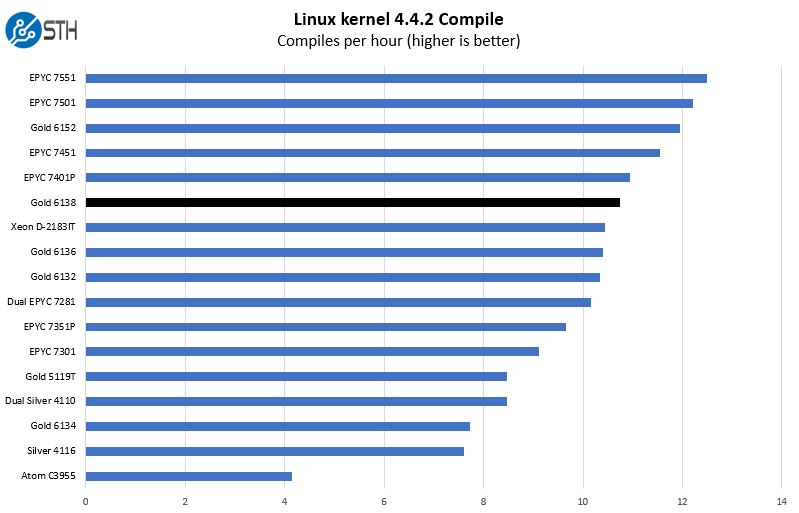
As you can see, the Intel Xeon Gold 6138 performs well here. Although the maximum turbo speeds are 3.7GHz, the actual clock speeds in this workload are much lower which is why the results are relatively closer to the fewer core but higher clocked Intel Xeon Gold 6136.
c-ray 1.1 Performance
We have been using c-ray for our performance testing for years now. It is a ray tracing benchmark that is extremely popular to show differences in processors under multi-threaded workloads. We are going to use both our legacy 4K result along with our new Linux-Bench2 8K render to show differences.
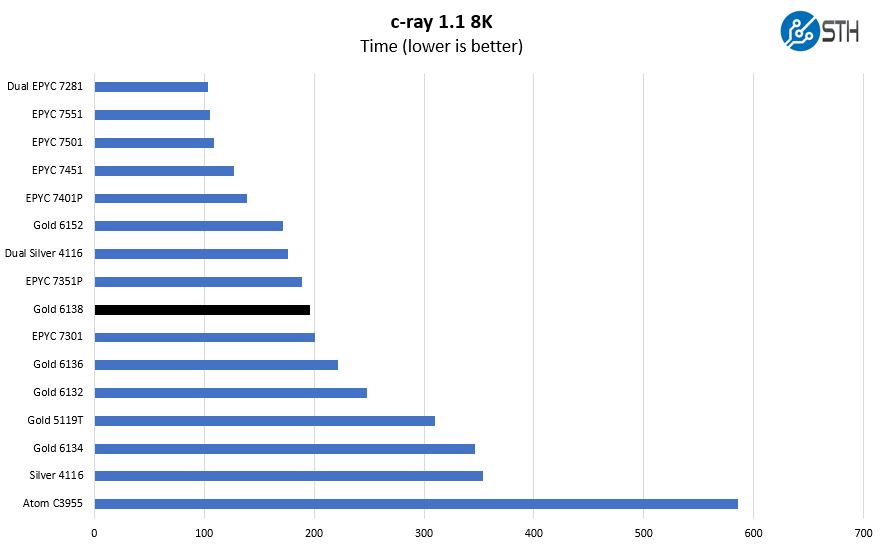
Here the additional cores add a lot of performance over the lower-numbered SKUs. This is also the part of the Intel Xeon Gold 6100 range where a single CPU is competitive with dual Intel Xeon Silver parts.
7-zip Compression Performance
7-zip is a widely used compression/ decompression program that works cross-platform. We started using the program during our early days with Windows testing. It is now part of Linux-Bench.
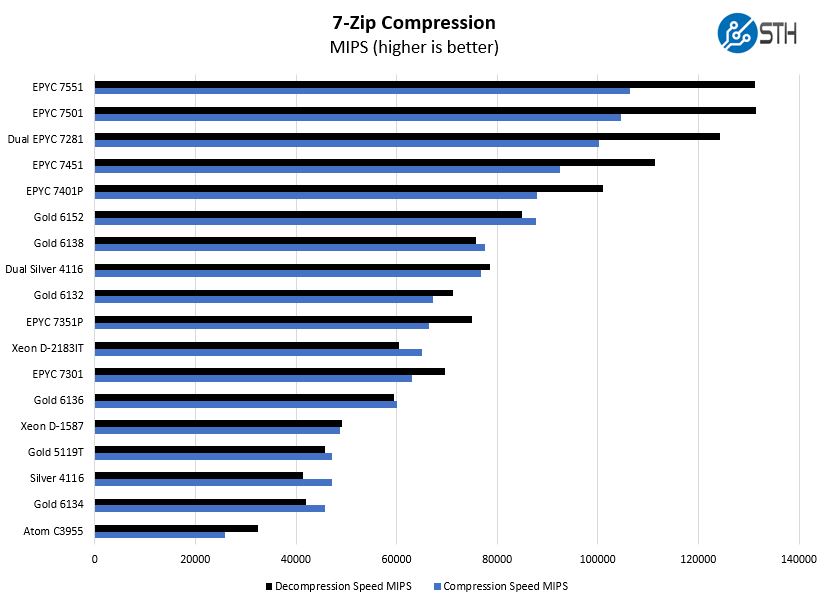
On the compression side, we see the single Intel Xeon Gold 6138 pull even with dual 12 core Xeon Silver 4116 CPUs. Clock speeds of the Gold 6138 make up for the 20% additional cores that the dual Silver 4116 setup has.
NAMD Performance
NAMD is a molecular modeling benchmark developed by the Theoretical and Computational Biophysics Group in the Beckman Institute for Advanced Science and Technology at the University of Illinois at Urbana-Champaign. More information on the benchmark can be found here. We are going to augment this with GROMACS in the next-generation Linux-Bench in the near future. With GROMACS we have been working hard to support Intel’s Skylake AVX-512 and AVX2 supporting AMD Zen architecture. Here are the comparison results for the legacy data set:
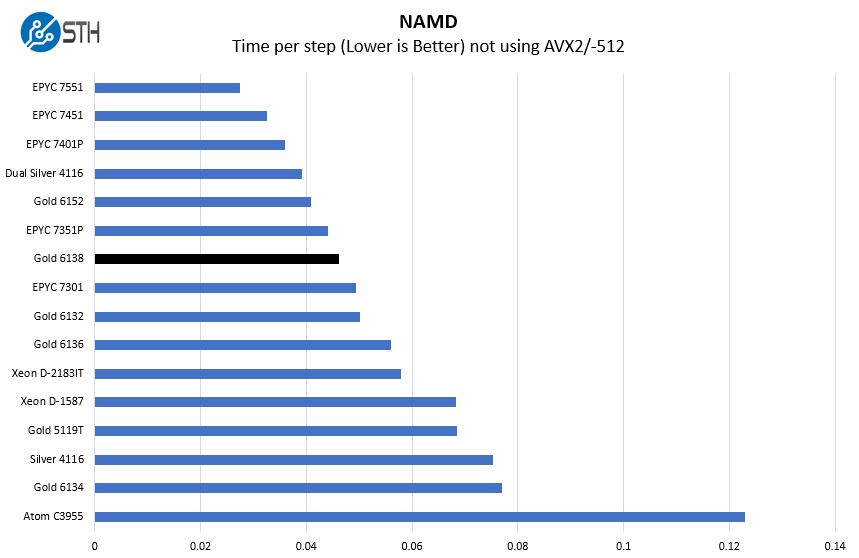
Here we see a few interesting results. One item to keep in mind is that there is a bigger jump in price from the Gold 6138 to the Gold 6152 than there is from the Gold 6136 to Gold 6138 even though the performance delta is not as great.
Sysbench CPU test
Sysbench is another one of those widely used Linux benchmarks. We specifically are using the CPU test, not the OLTP test that we use for some storage testing.
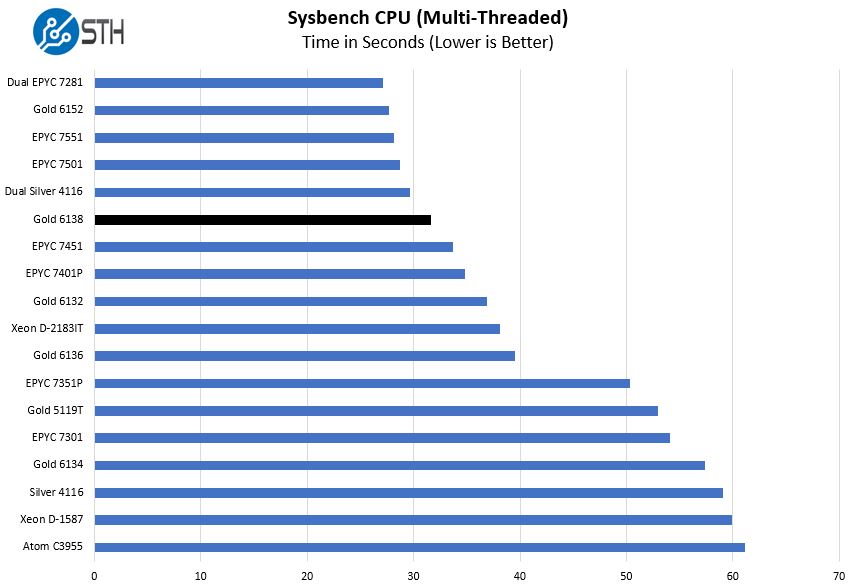
On the sysbench CPU side, we see solid performance again from the CPU. Here the Gold 6138 with 20 cores is able to outpace AMD EPYC 24 core offerings. The AMD EPYC 7451 is a chip with strong single socket performance and in the same price range as the Gold 6138. In many of these micro benchmarks EPYC performs very well, but the Gold 6138 is still a solid option.
OpenSSL Performance
OpenSSL is widely used to secure communications between servers. This is an important protocol in many server stacks. We first look at our sign tests:
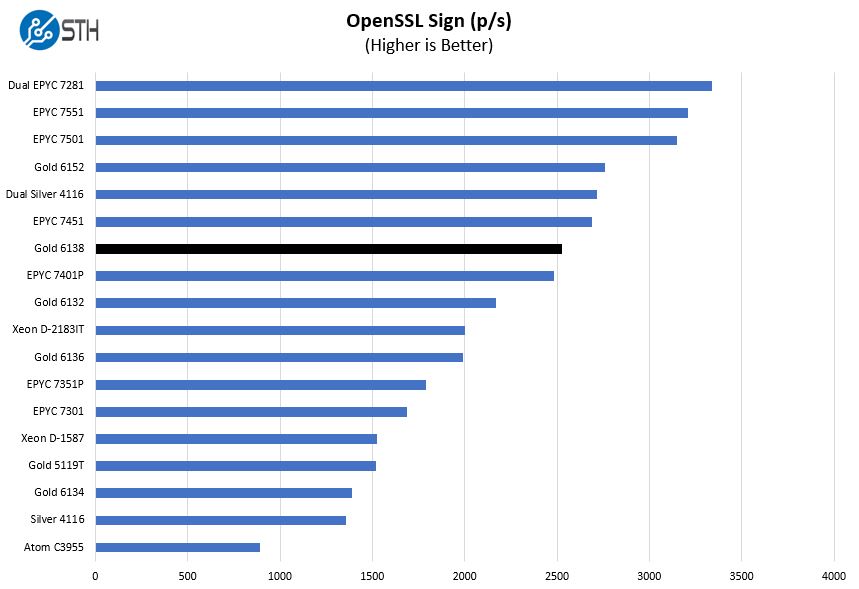
here are the verify results:
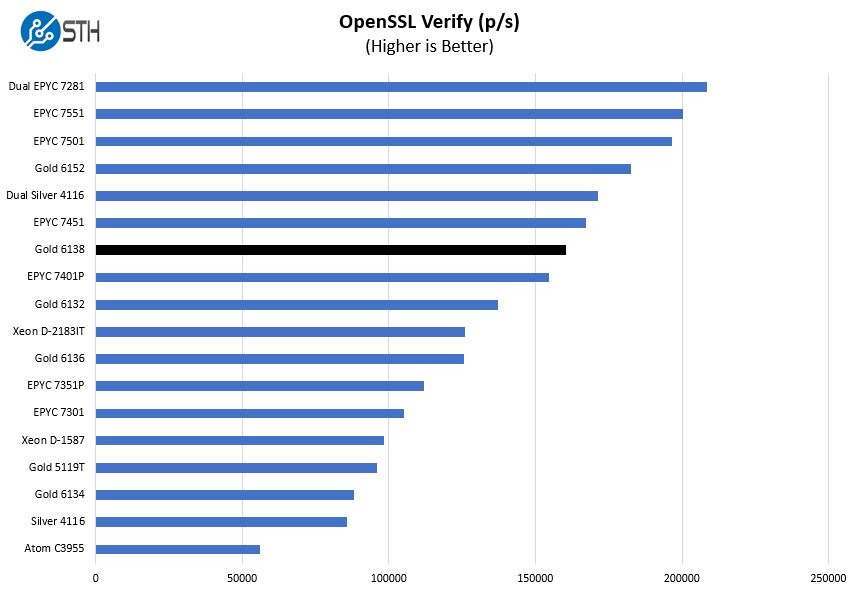
Here the 20-core Intel Xeon Gold 6138 falls just between the two AMD EPYC 24 core offerings. In single socket only configurations, the EPYC 7401P is the best value of the bunch.
UnixBench Dhrystone 2 and Whetstone Benchmarks
Some of the longest-running tests at STH are the venerable UnixBench 5.1.3 Dhrystone 2 and Whetstone results. They are certainly aging, however, we constantly get requests for them, and many angry notes when we leave them out. UnixBench is widely used so we are including it in this data set. Here are the Dhrystone 2 results:
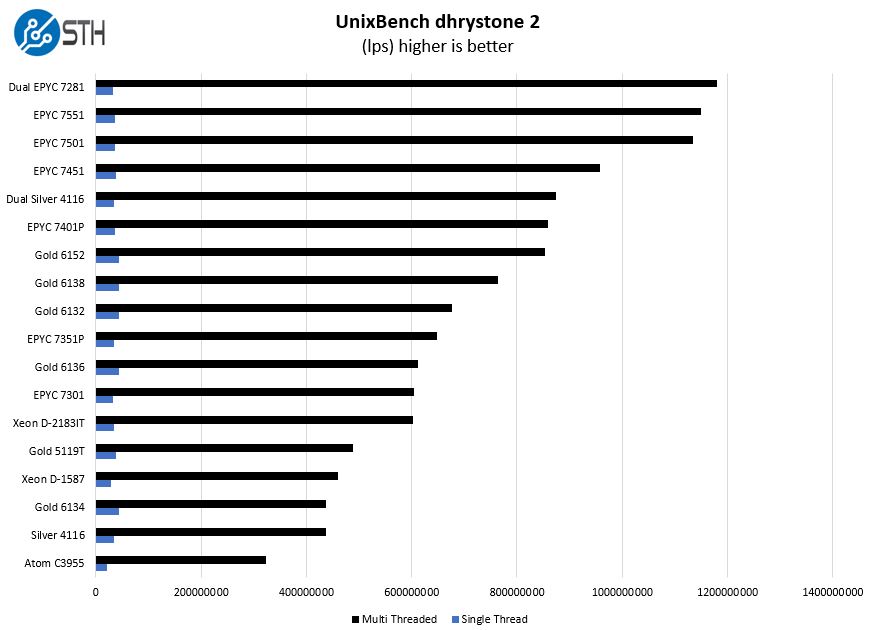
Here are the whetstone results:
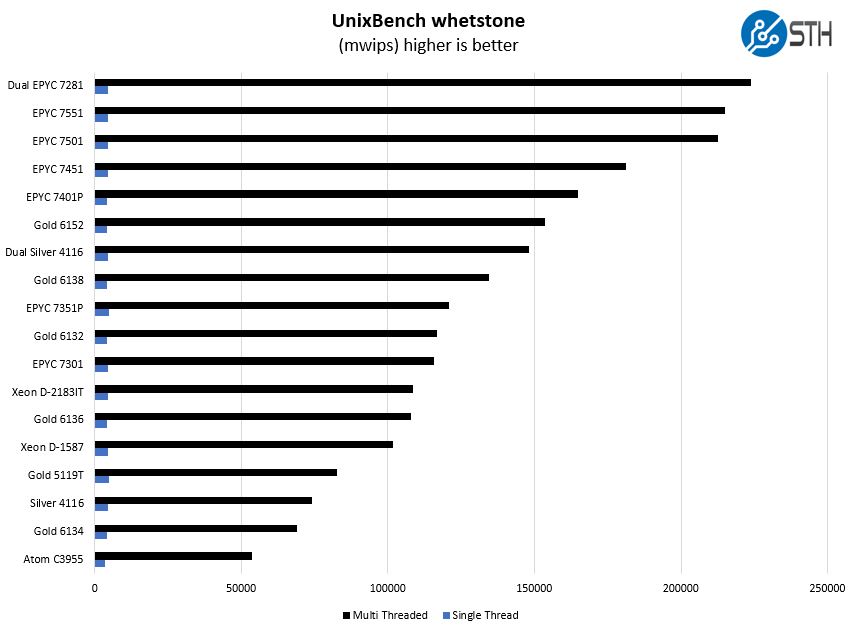
Here the Intel Xeon Gold 6138 performs well, and shows a large lead over the other Gold 613x series parts. This is a benchmark where AMD EPYC performs exceptionally well.
GROMACS STH Small AVX2/ AVX-512 Enabled
We have a small GROMACS molecule simulation we previewed in the first AMD EPYC 7601 Linux benchmarks piece. In Linux-Bench2 we are using a “small” test for single and dual socket capable machines. Our medium test is more appropriate for higher-end dual and quad socket machines. Our GROMACS test will use the AVX-512 and AVX2 extensions if available.
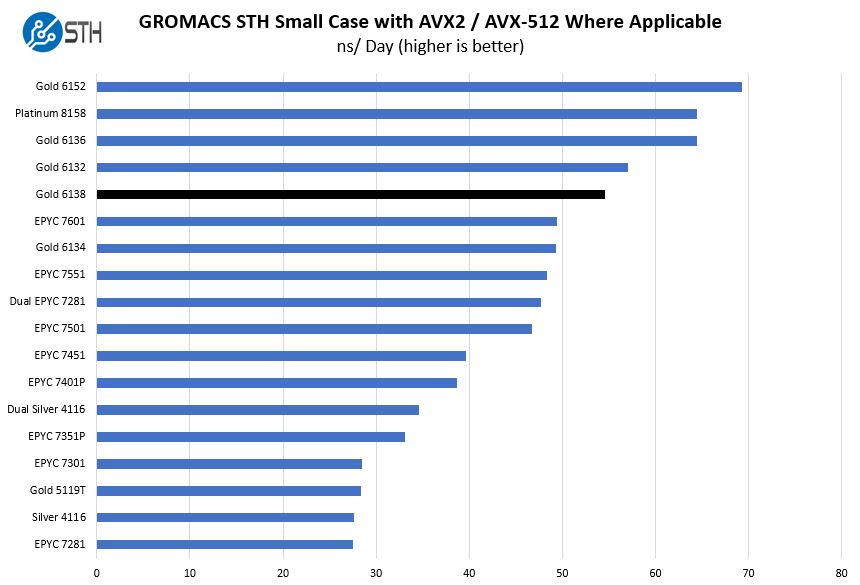
AVX-512 turbo frequencies are an interesting topic themselves. Also, as real applications have to transition from cores running AVX-512 to AVX2 or non-AVX execution, the chips have to manage clocks accordingly. Modern Intel Xeon Scalable CPUs can manage clock speeds based on the code that individual cores are running. Sometimes, the frequency changes can have major negative impacts on performance, as can the lower TDP rating of this part of 125W (compared to 150W for the Gold 6136.) Here we see one of the performance oddities of AVX-512 where the Gold 6138 performs well, but a bit off from where we might expect due to clock speed throttling.
Chess Benchmarking
Chess is an interesting use case since it has almost unlimited complexity. Over the years, we have received a number of requests to bring back chess benchmarking. We have been profiling systems and are ready to start sharing results:
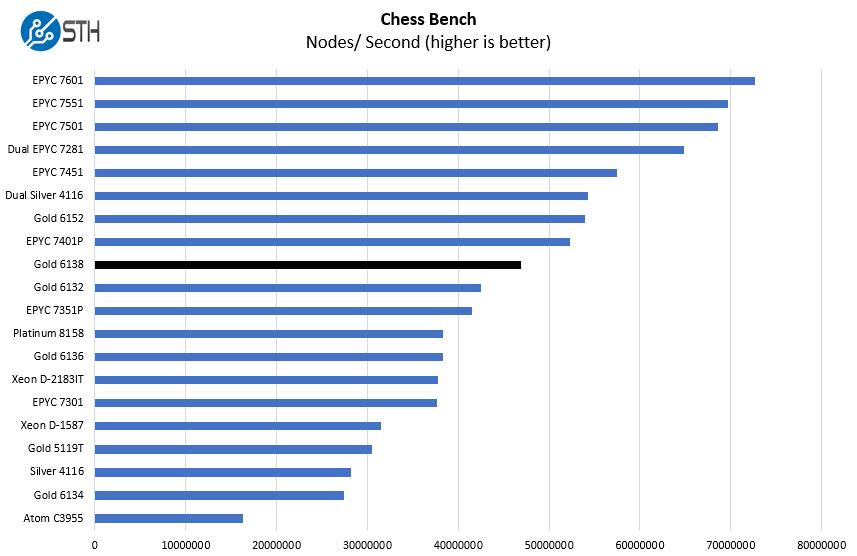
Here we wanted to highlight an interesting oddity. The $2600 Intel Xeon Gold 6138 is outperforming the $7007 Intel Xeon Platinum 8158. We discussed this in our Intel Xeon Platinum 8158 v Intel Xeon Gold 6136 Differences but Intel’s SKU stack’s performance is not linear with the model number increments.
Next, we are going to look at the Intel Xeon Gold 6138 power consumption along with market positioning. We will then provide our concluding thoughts on the CPUs.




As long as the cooling is sufficient the 6138 turbo-clocks as follows:
Normal 2.7 GHz all-core
AVX2 2.3 GHz all-core
AVX512 1.9 GHz all-core